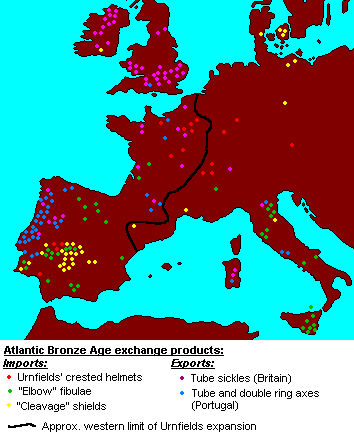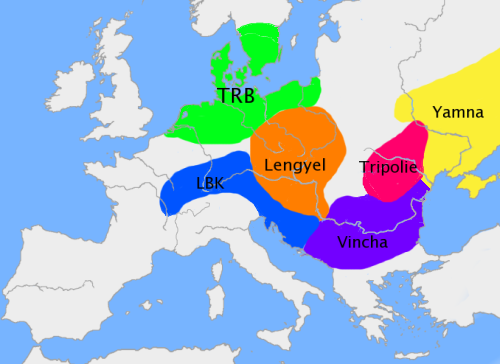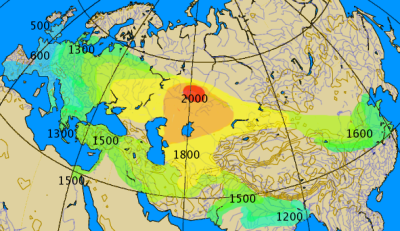The present-day population of R1b, with extremely high peaks in Western Europe and measured up to the eastern confines of Central Asia, are believed to be the descendants of a refugium in the Iberian peninsula (Portugal and Spain) at the Last Glacial Maximum, where the haplogroup may have achieved genetic homogeneity. As conditions eased with the Allerød Oscillation in about 12,000 BC, descendants of this group migrated and eventually recolonised all of Western Europe, leading to the dominant position of R1b in variant degrees from Iberia to Scandinavia, so evident in haplogroup maps. The most common subclade is R1b1c9, that has a maximum in Frisia (the Netherlands). It may have originated towards the end of the last ice age, or perhaps more or less 7000 BC, possibly in the northern European mainland.[3]
Developments in genetics take away much of the edge of the sometimes heated controversies about invasions. While findings confirm that there were population movements both related to the beginning Neolithic and the beginning Bronze Age, corresponding to Renfrew's and Gimbutas's Indo-Europeans, respectively, the genetic record obviously cannot yield any direct information as to the language spoken by these groups. The current interpretation of genetic data suggests a strong genetic continuity in Europe; specifically, studies by Bryan Sykes show that about
80% of the genetic stock of Europeans originated in the Paleolithic, suggesting that languages tend to spread geographically by cultural contact rather than by invasion and extermination, i.e. much more peacefully than was described in some invasion scenarios, and thus the genetic record does not rule out the historically much more common type of invasions where a new group assimilates the earlier inhabitants. This very common scenario of successive small scale invasions where a ruling nation imposed its language and culture on a larger indigenous population was what Gimbutas had in mind:[citation needed]
The Process of Indo-Europeanization was a cultural, not a physical transformation. It must be understood as a military victory in terms of imposing a new administrative system, language and religion upon the indigenous groups.






 Reply With Quote
Reply With Quote













Bookmarks